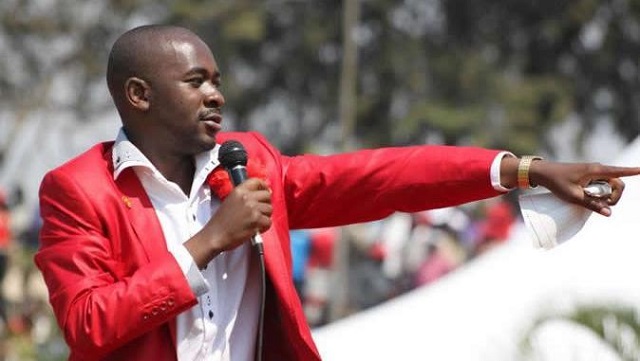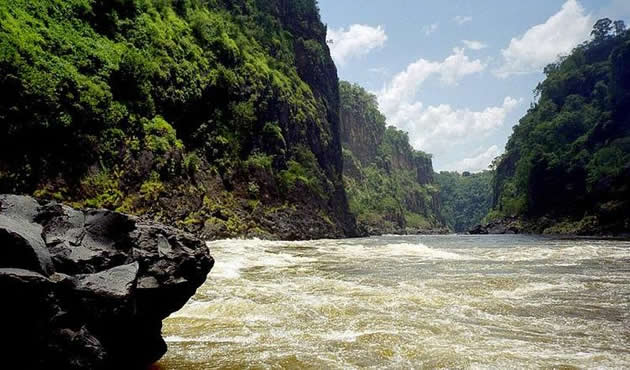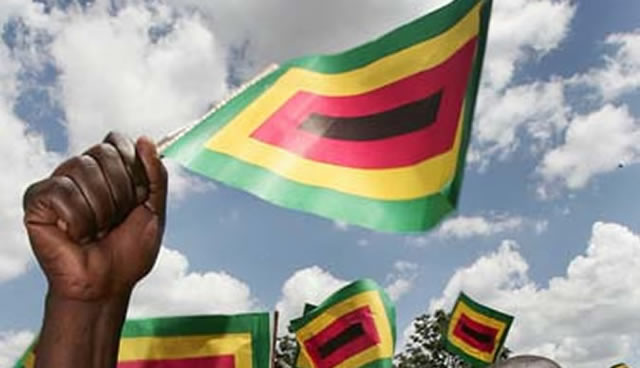All confidence & no substance: Exciting road to defeat

Reason Wafawarova
Nelson Chamisa is a great gentleman with admirable determination and an exceptional drive of ambition. He inherited a political outfit that was at the crossroads because the then leader was simply exhausted and tired, much as he did not want to let go of what he believed was a party whose leadership he was entitled to even extra-constitutionally.
While Chamisa’s takeover of the MDC-T outfit has breathed a new sense of life in the party, the excitement is no more than a noisy minority deification of a man struggling to live up to the myth that his followers are conjuring up in order to create a make-believe power strong enough to dismantle Zanu-PF’s grip on the country’s political landscape.
The exiting of Robert Mugabe from the country’s political scene took with it the basis of the MDC-T’s protest politics. For 18 years the MDC-T premised its very existence on the “Mugabe must go” mantra. This was a slogan that resonated so well with Western funders who were equally obsessed with the idea of removing Mugabe from power. Not only was Mugabe an irritant to the West because of his domestic policies, but also because he carried a revered stature internationally, and was evidently admired by many people from the developing world.
Morgan Tsvangirai had hoped to capitalise on the advanced age of Robert Mugabe to win the 2018 election, but as fate would have it, Mugabe would first leave the political stage through an ouster by his own Zanu-PF party, and Tsvangirai would follow suit through death by natural causes.
In came ED Mnangagwa in place of Mugabe and Nelson Chamisa in place of Morgan Tsvangirai. Nelson Chamisa has tried so hard to force Mugabe’s hat on the head of Mnangagwa – all because he has to find a good reason to bring back the protest vote.
On the other hand Mnangagwa has charmed the West as a reformist far different from his predecessor, has introduced a whole raft of changes to the human rights regime in the country, opening up political space, fighting corruption, attracting investment, opening up the country for business, and generally showing to the world that Zimbabwe is closing the Mugabe era to retrace its place among the family of nations back to its time as the bread basket of Africa, as the second strongest economy in Africa after South Africa.
Morgan Tsvangirai had become a brand as his supporters kept saying, and because of this deification, Nelson Chamisa comes as a second choice, and a second choice is never viewed as the best choice. Given that the best choice lost the election emphatically in 2013, others in the MDC-T outfit remain unconvinced that Nelson Chamisa has what it takes to win an election against Zanu-PF. This explains the whole conflict saga with Thokozani Khupe, Obert Gutu and others. Even Douglas Mwonzora and Elias Mudzuri are not convinced. Tendai Biti offers “just in case” support, but he has already made it public that Zanu-PF did not remove Mugabe in order to give power away, and he knows exactly what he is talking about.
The reforms by Mnangagwa are a quagmire for Nelson Chamisa and his MDC Alliance partners. They prefer a brutal Mnangagwa, a replica of the Mugabe type of opponent, they prefer to have their rallies banned by the police, they prefer persecution, arrests, suppression and so forth. Mnangagwa is not getting the mass angering bad publicity that Chamisa badly needs against his opponent, and this is becoming a problem. Nelson Chamisa and his friends are least impressed with the increased democratic space, and they are certainly incensed with Mnangagwa’s re-engagement drive, especially with the Western world.
Nelson Chamisa tried to dismiss Thokozani Khupe as “a child” in his address of Zimbabweans in the UK and there was deafening silence to that remark. He saw the danger and quickly switched to saying she was still welcome to his corner of the split. The palace coup ghost keeps haunting Nelson Chamisa, and Khupe is not going to go away. The split anchors itself in hate and bitterness, and it has brought legitimacy and legal battles that could give Chamisa deadly nightmares in the run up to this lection.
The Western cross over led by the United Kingdom is another nightmare for Chamisa. He simply cannot see an election victory without the West in his corner. He has labelled the cosy relations between the Mnangagwa administration and Britain a huge mistake, but he has dismally failed to impress as an alternative himself.
The characters surrounding Nelson Chamisa are frankly unimpressive on Zimbabwe’s political scene. Welshman Ncube and Biti are shamed returnees who faltered dismally with their own political projects, and Chamisa rides on this to control them. Slouching opportunists dying to get jobs and privileges surround Nelson Chamisa, mostly former student leaders of the 1996 to 2000 era, especially those with a University of Zimbabwe background. Some have moved back from the diaspora to Zimbabwe already, to strategically wait for the opportunity to reap on proceeds of historical association.
One challenge Chamisa faces is how to manage the intricacies of his very weak alliance. Six weaklings partner the MDC-T in an alliance formed purely to psychologically woe Mai Mujuru and her NPP at the time. Put simply the alliance partners have only their names brought to the alliance, and no followers at all.
This has been Khupe’s argument from the time Tsvangirai was alive; and she has a point. The alliance partners are free riders that will cost the MDC-T seats, and Chamisa does not even want to think of how he will solve this quagmire. He is hoping it will just go away, but the truth is the alliance will explode very soon.
The Matebeleland vote is not as guaranteed as it has been since 2000, and Chamisa is aware of that.
Nelson Chamisa cannot pretend to have an untainted moral platform when he is leading a party of councillors that have become notorious for ruining urban service delivery systems through endemic corruption. He also knows that his own roughshod disregard for constitutionalism is now a political headache. He cannot even stomach the idea of primary elections in his own party, and this is because he himself avoided the vote to be where he is.
Nelson Chamisa is all confidence and no substance, and his only reason for being this overly excited is the misguided belief that Zimbabweans are dying to have a young leader; simply because Mugabe reached his nineties in leadership.
He knows his party has no effective structures in the rural areas, and he now relies merely on rallies to reach out to this electorate. But a single rally at Murehwa centre hardly gathers 20% of the electorate in Murehwa district, as will not a rally of 4 000 people at Nyika Growth point in Bikita. And rallies generally attract existing supporters, not new ones.
Someone must have told Nelson Chamisa he is an excellent orator. That was a huge mistake. He stands somewhere between an eloquent evangelist and a comedian. He does not have what it takes to make the grade in the class of world-renowned political orators – the likes of Winston Churchill, Martin Luther King, Robert Mugabe, J.F Kennedy, Barrack Obama, Nelson Mandela, or Harry Truman.
While in the United Kingdom Nelson Chamisa tried hard to impress but he failed. Even his die-hard supporters know very well that they are only pretending to be impressed. It is just painful to accept that they were not impressed, because they are simply dying to be impressed.
While at Chatham House Chamisa said Zimbabwe has been a nation without ideas and needs to regain the sense of vision and purpose from the liberation struggle era. He shares that sentiment with his opponent ED Mnangagwa. The difference is Mnangagwa is implementing the new vision while Chamisa is preaching far-fetched ideas aimed at impressing crowds.
Professor Diana Jeater of Liverpool University attended Nelson Chamisa’s Chatham House address and left “unimpressed and discouraged.” That is not surprising. Chamisa has recently turned himself into a village impresser with no depth good enough to impress the intellectual community.
He mapped out his usual five-pillar programme: governance, economy, social rights, infrastructure, and international relations.
He talked of “Big Ideas not Big Men”. As usual he failed dismally to explain the transformation he sloganeers so much about. He went on the now too predictable attack of Zanu-PF without showing anyone in the room how distinct the MDC Alliance is from Zanu-PF. He was as has become the norm, reactive and retrogressive.
As Prof Jeater pointed out some of the things Chamisa said simply did not add up. He was calling for big ideas, yet he did not give any single big idea in his speech.
Any darn fool can make a call for big ideas, but an aspirant for the presidency of a country must do a little more than a darn fool – must outline the big ideas.
As Prof Jeater said, Chamisa’s only Big Idea is changing the government. That idea used to impress Mugabe’s foes in the West, but Chamisa must realise that Mnangagwa does not have irate foes waiting to be impressed by anyone angered with his administration. Mnangagwa is simply not a shared enemy between the MDC and the West. That was Robert Mugabe.
Chamisa’s technocratic fixes were largely borrowed from Zanu-PF’s manifesto and from what Mnangagwa has been saying lately, and that did not help matters from him.
Mnangagwa’s envoy SB Moyo was in the same room three weeks ago, and the same audience was now listening to Chamisa parroting exactly what they had heard from the Zanu-PF politician.
Chamisa proposed value addition as has always been said by Arthur Mutambara and others. This has been Zanu-PF’s policy for almost ten years now, and the party even banned chrome exports for some time to show its resolve. The ban was lifted in 2015 because there was no processing capacity.
Chamisa wanted to present value addition as his Big Idea, and people like Prof Jeater were less than impressed. Intellectuals do not like imposters and plagiarisers at all. What Chamisa needed to do was acknowledge the existence of the policy, and then offer an alternative solution to the lack of processing capacity.
Equally Chamisa was supposed to tell his audience why introducing a new currency in place of the bond notes would make the people of Zimbabwe treat differently the new currency from the way they treat the bond notes. Why would people suddenly develop faith in this new currency?
His point on production lacked clarity and scientific detail. You cannot fly all the way to London to simply say we need “to produce more” without explaining how.
As usual Chamisa dwelt so much on elections, and hardly said anything about what happens after the election. He insisted that his party would not accept defeat after the election, but could not convince his audience on how that would achieve anything for either his party or for the country.
His only talk about governance after the election was the declaration to revisit Mnangagwa’s deals to see if they are not “shady”. But that is reactive, and Chamisa was saying this at a time he is still smarting from the backlash of his call to boot out the Chinese if he were to be elected into government.
Chamisa would do well selling his Big Idea as an alternative to Mnangagwa’s policies, but he has to accept that the election has two possible outcomes, a win or a loss. He has never won a national election once, yet he seems to be in denial that losing one is a practical possibility.
Social rights appeal to everyone with a conscience, but Nelson Chamisa needs to offer a strategy on how the weak and the vulnerable can be taken good care of.
Suggesting Zimbabweans in the diaspora would euphorically fly back to voluntarily use their acquired new skills to help the weak and vulnerable based on the simple motivation of a Chamisa government is myopic at the least, and should never be said on a platform where part of the audience hail from the intellectual community.
Nelson Chamisa loves absolutist posturing. He loves to posture as the no nonsense little fellow that will simply make Zimbabwe ungovernable if an election result other than a win for himself is announced.
Pressed to explain exactly what his strategy in rejecting the election would be, he stammered before saying the EU and the UN would intervene. Even that suggestion hardly makes any sense. In fact it does not even rise to the level of nonsense. Tsvangirai did not accept any election result he featured in, and everyone in that room knew that neither the EU not the UN intervened.
Nelson Chamisa needs a good speechwriter, a very good strategist, a tried and tested public policy expert. He is an over-excited political zealot magnified by the misleading noisy of his supporters.
Here is what Prof Jeater had to say about some of the dumb things Chamisa said in London:
“And he said some really dumb things: ‘Most of the people working in the NHS are Zimbabwean … The independent parties registering to contest the election are mostly surrogate Zanu PF fronts … We will not be side–tracked by gender-violence issues’.
“And dumbest of all ‘…the day when President Chamisa enters Zimbabwe House and begins to reign’. Govern is the word he was looking for.”
“Govern. I really hope, for Zimbabwe’s sake, that he knows the difference.”
Nelson Chamisa is all confidence and no substance, all charm and no character, all eloquence no content, all humour no context.
Zimbabwe we are one and together we will overcome. It is homeland or death!
Reason Wafawarova is a political writer based in SYDNEY, Australia.











Comments